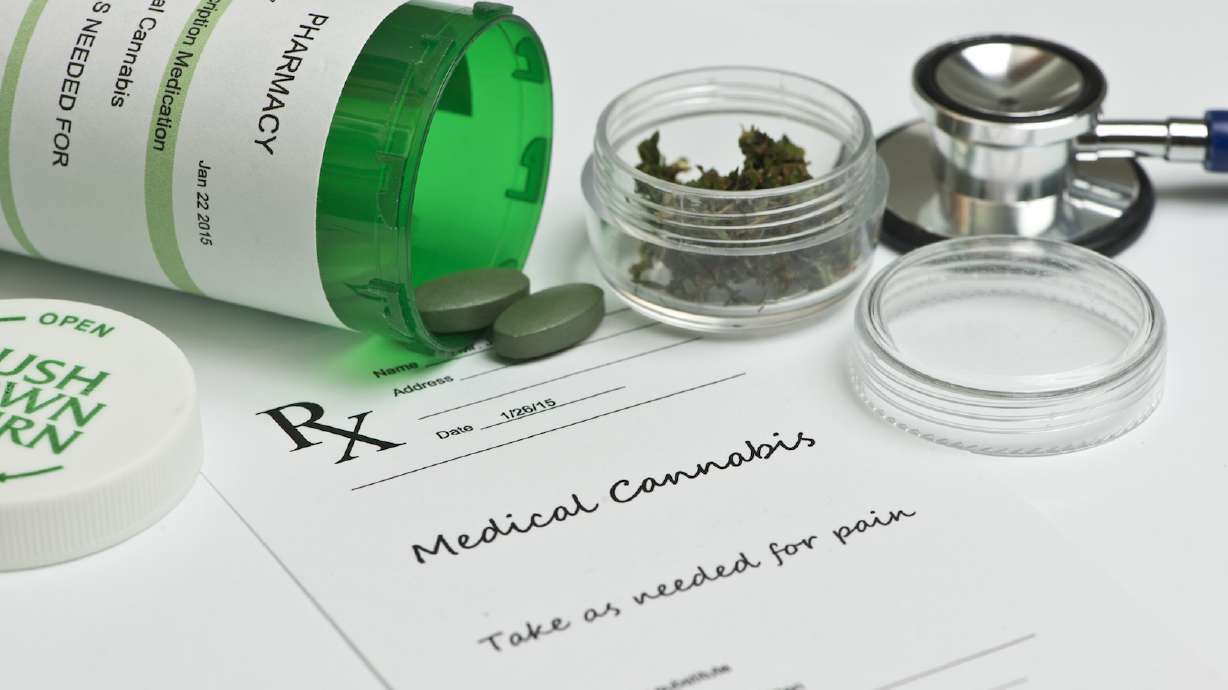Estimated read time: 4-5 minutes
This archived news story is available only for your personal, non-commercial use. Information in the story may be outdated or superseded by additional information. Reading or replaying the story in its archived form does not constitute a republication of the story.
SALT LAKE CITY — The Utah Department of Health on Friday announced the pharmacies that will be licensed to sell medical marijuana at 14 locations across the state starting in March.
“That’s a major milestone for a lot of reasons. These companies can start to verify their locations and hire employees and really make some serious preparations for March when they plan to, when some of them will need to be rolling out,” Richard Oborn, director of the Utah Department of Health’s Center of Medical Cannabis, told the Deseret News.
The following pharmacies will receive licenses to sell cannabis products:
- Beehive’s Own, two licenses, Salt Lake City and Box Elder, Morgan or Rich County.
- Bloom Medicinals, Cedar City.
- Columbia Care, Springville.
- Curaleaf, Lindon.
- Deseret Wellness, two licenses, Park City and Provo.
- Justice Grown Utah, two licenses, Salt Lake City.
- Pure UT, Vernal.
Three of the selected pharmacies also hold marijuana cultivation licenses:
- Dragonfly Wellness, Salt Lake City.
- True North of Utah, two pharmacy licenses, Logan and Ogden.
- Wholesome Therapy, West Bountiful.
Efforts to contact the pharmacies for comment late Friday afternoon were unsuccessful. “Some of the companies to whom the department intends to award licenses do not yet have ownership of their proposed locations, and in some cases, their proposed locations may change. Their operating plans are pending department approval and their owners must still pass criminal background checks,” according to a statement from the health department.
The licenses were divided among four geographic regions. The pharmacies will open in two phases, with eight pharmacies able to open in March. Another six will be allowed to open as early as July.
It is unclear whether all 14 pharmacies will be prepared to open in March and July, Oborn said, but many that applied indicated they could open in March.
The pharmacies were chosen out of 130 applications made by 60 different companies, according to the health department. Seven are owned — or partially owned — by Utahns.
Connor Boyack, president of Libertas Institute, which advocates for medical marijuana, called the number of pharmacies granted licenses “a huge milestone in getting the program fully launched in the next few months.”
“We’ve been working for years for moments like this, and it’s very gratifying to see the progress. Looking forward, we are working on some important changes for the upcoming legislative session to make this program even better for patients,” Boyack said in a statement.
Related:
Utah voters approved the medical marijuana ballot initiative, Proposition 2, in November 2018 legalizing doctor-approved marijuana treatment for certain health conditions. State lawmakers the next month replaced the measure with a law they said puts tighter controls on the production, distribution and use of the drug.
The bill originally called for the creation of a state-run central pharmacy and local county health department pickups. But after two county attorneys told their local health departments not to distribute marijuana, which is illegal under federal law, an alternative bill passed during a special session allowing 14 pharmacies to sell medical cannabis and eliminating public health workers from the equation.
Oborn called those changes “critical in the program being able to roll out.”
“We’re very excited to have a program that will be able to help patients, that’ll be able to register providers, and that’ll be able to educate the public about medical cannabis. And we’re excited to bring in some partners with the medical cannabis pharmacies, and they’ll be able to provide products directly to patients who qualify and who are in need of having their product convenient. Being able to purchase it in Utah is a big deal to them,” Oborn said.
The next step will be a statewide push to educate health care providers about medical marijuana through January and February, he said.
“One of the concerns that some people have is that there’s not enough providers that are willing to recommend medical cannabis to patients. And that’s a critical first step that has to happen in order for a patient to get product, is they have to get connected with a provider that’s willing to recommend the product to them,” according to Oborn.
People can find information about providers on medicalcannabis.utah.gov. The state database will include a list of medical personnel who have registered to recommend cannabis and who have opted to be included in the list.
Doctors can also find information on that site about presentations that will take place statewide to help them understand how to recommend medical marijuana.
“It’s all about educating providers so they can make a critical decision about whether they want to recommend medical cannabis or not. Whether they choose to or not, that’s up to them. But regardless, they should learn generally about the product, because a lot of their patients are going to be asking about it,” Oborn explained.











